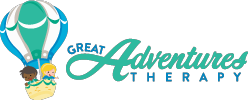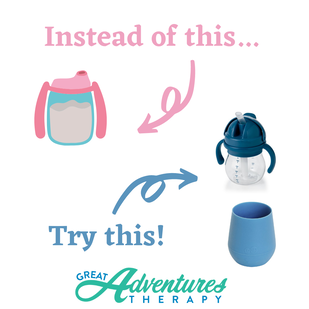|
Stores across America will tell parents that at six months of age, a child is ready to move to a sippy cup. So many of these are on the market and I regularly get asked, “so what sippy cup should I buy?” My answer is always a little surprising: “None of them!” As a parent, I completely get the appeal of a sippy cup. They are spill-proof and allow for easy “on the go” drinking for our little ones. However if we look at feeding/drinking skills, these sippy cups really don’t have much to offer. In fact, we can easily skip the hard-spout sippy cup all together! Why should we try to avoid these? Sippy cups can prevent a mature swallow pattern. When our babies use hard spout sippy cups, the spout rests on top of the tongue, preventing it from elevating to the alveolar ridge, like it does in a more mature swallow. If your baby exclusively uses a spouted cup, they are continuing the swallowing pattern they had as infants (more front to back tongue movement) and not developing the wave-like motion the tongue needs during a mature swallow. Sippy cups can impede speech and language development. When the tongue consistently rests low and forward in the mouth, as seen in children who have prolonged use of a pacifier and/or sippy cup, the tongue will develop a low and forward resting posture as well. This may hinder the development of speech sounds as the child grows. Sippy cups can alter facial development. A tongue position that is in a low and forward resting position will further encourage the lowering of the jaw musculature, giving a child what is often called “long-face syndrome.” So what do I give my baby instead? Try these options! Straw cups. Did you know that children can drink from a straw at nine months old? Don’t be afraid to give it a try! Ideally, a straw cup for a child will have a short straw, or the straw can be trimmed so that it doesn’t prevent tongue tip elevation during drinking. If trimming the straw, keep it mind that it is best to do this after the child has mastered straw drinking.
Open cups. It’s never too early to start training with an open cup! Start small, using a medicine cup at mealtimes. This gives them a small amount for practice and reduces the mess from spills. As they progress, you can look into small open cups that fit their little hands well, such as small paper cups or EZPZ mini cups. If you are in the Knoxville area and have questions or concerns regarding your child’s feeding development, please give us a call at (865) 236-0103 for a free consultation. We’d love to meet you!
0 Comments
Leave a Reply. |
AuthorChariti is a licensed/certified Speech Language Pathologist in Knoxville, Tennessee and owner of Great Adventures Therapy. LLC. Archives
December 2022
Categories |
9000 Executive Park Drive Suite #A205
Knoxville, TN 37923
Phone: (865) 236-0103
Fax: (865) 674-5447
[email protected]
Knoxville, TN 37923
Phone: (865) 236-0103
Fax: (865) 674-5447
[email protected]


 RSS Feed
RSS Feed
